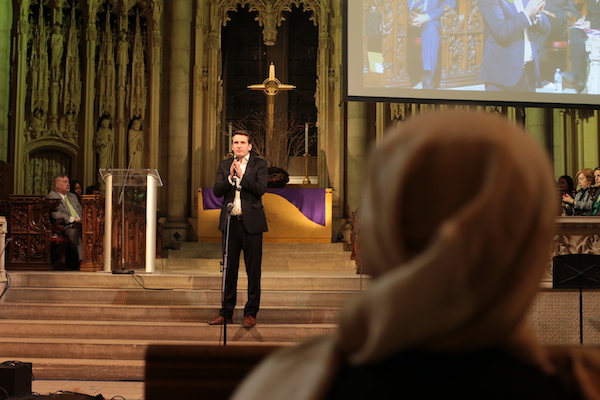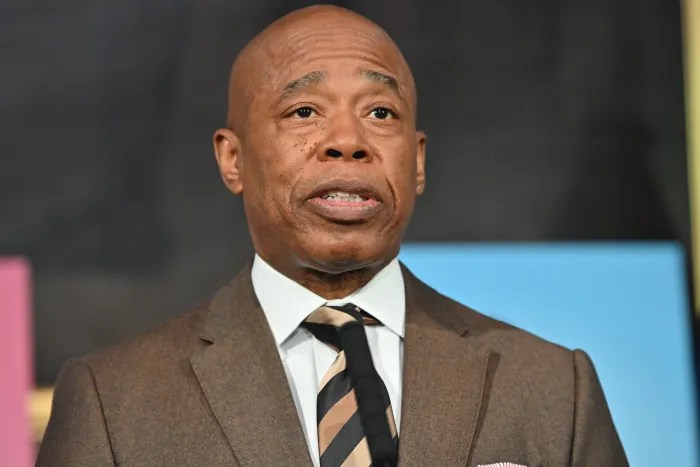
BY ANDY HUMM | While America was reeling from the election results, Aodhán Ó Ríordáin took the floor of the Irish Senate on November 11 and said with passion, “America has just elected a fascist, and the best thing that the good people in Ireland can do is to ring him up and ask him, ‘Is it okay to still bring the shamrock on Saint Patrick’s Day?’”
It rang so true and clear, while many elected officials in the US were saying they would try to find common ground with Trump, that the video has gotten — in aggregate, across numerous platforms — 45 million views.
Ó Ríordáin, of the Labour Party, did not let his disgust for Fine Gael Prime Minister Enda Kenny’s normalization of Trump end there. When Kenny went through with a White House visit for St. Patrick’s Day, Ó Ríordáin threw together with American allies from a broad range of communities a three-hour St. Patrick’s Day evening celebration of social justice called Irish Stand at the historic Riverside Church on West 120th Street where 50 years ago Martin Luther King, Jr. delivered his declaration against the Vietnam War. (Kenny must have been feeling the heat because standing next to Trump the day before he delivered a pro-immigration message that was interpreted as a challenge to him, calling St. Patrick “the patron of immigrants” and saying, “Four decades before Lady Liberty lifted her lamp, we were the wretched refuse on the teeming shore. We believed in the shelter of America, in the compassion of America, in the opportunity of America. We came and became Americans.”)
The invitation to the Riverside packed event read, “Let us remind this new administration, many of whom are Irish-American descendants of immigrants themselves, that the international community rejects the politics of division and fear. By working together, we can lead by example and make a difference in America and across the world.”
Among the 30 speakers and artists was State Assemblymember Daniel O’Donnell of Manhattan who said that his mother died when he was 12 on March 17, 1973 and it was “the hardest day of my life,” so “I don’t do St. Patrick’s Day.” But he spoke this night “in the face of fascism in my own nation” and called Trump’s “narcissism a very serious disease. It eats at your soul and you lose all capacity for sympathy.”
Niall Connolly sang a song based on a Mexican proverb, “They tried to bury us. They didn’t know we were seeds.”
Author Colum McCann read Yeats’ “Second Coming,” whichspeaks of a time when “The best lack all conviction, while the worst/ Are full of passionate intensity.”
“All stories are too late,” he said, “otherwise they wouldn’t be needed.”
Terry McGovern, lesbian and AIDS activist on the board of the New York Civil Liberties Union, talked about how her “Irish American mother died on 9/11” and how she and the NYCLU “will fight vouchers for public education, fight for reproductive freedom, and defend justice. We will not stand for this.”
Joy Reid of MSNBC quoted Dr. King: “The time has come when silence is betrayal.”
And Aisling Reidy of Human Rights Watch invoked King’s dictum: “Our lives begin to end when we are silent about things that matter.”
Kathleen Walsh D’Arcy, of St. Pat’s for All and Lavender & Green, the LGBTQ group that marched that day in the Fifth Avenue St. Patrick’s Day Parade for the second time joined by Ó Ríordáin, said of Trump, “Irish American people will not sit down and take this kind of abuse from our government.”
Imam Shamsi Ali said, “Help us to break the walls that separate us” and condemned the “racist” campaign of Trump against immigrants.
Daniel Altschuler of Make the Road New York urged the assembled to call Irish American Republican Congressmembers Dan Donovan of Staten Island and Peter King of Long Island “who support the Muslim ban.”
Ó Ríordáin wrapped up the long but spirited evening, saying that when he gave his Senate speech, “I thought it wouldn’t go further than the room. I called the president a fascist and I think I was proved right.” He spoke of how “we need each other” and how important it was for LGBTQ people and Muslims and others “not to be in the shadows.” And he added, “Those who stand for an immigrant ban have no Irish lived experience.”
“There is unity in strength and strength in unity,” Ó Ríordáin said.


































